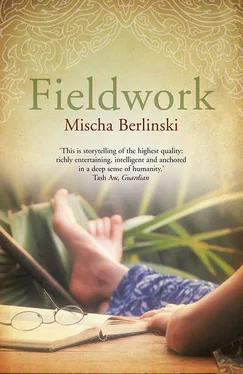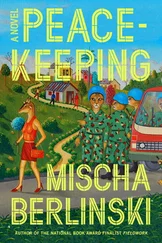There was a question about iron knives: "Do you guys have any insight at all into the business about pregnant women and knives? Why can they use bamboo but not iron knives? It's driving me insane." And a question about the Dyalo calendar: "I'm confused by the calendar … It's a lunar calendar? But it forms a solar year?" "Sure, because you've got the New Year's feast days at the end." Martiya asked about rice planting and how the fields were distributed; about Dyalo marriage (which inevitably digressed into discussion of the difference between a heathen marriage and a true, Christian marriage); bride-price, and the conflict in the missionary community about whether bride-price was to be suppressed, the Bible being largely silent on this crucial issue (Mr. Walker: "We like to let them do what they think is best, but we discourage the bride-price. Christians shouldn't buy and sell each other, that's just what I think"); sex and eating taboos, of which there were at least one zillion; Dyalo notions of village, jungle, and field, where one ended and the other began, who lived in each, and why the Vampire clan at the foot of the village were considered jungle people and not village people; the New Year's feast; the magical rites associated with hunting, gardening, rice planting, and opium growing; and conflict in the village and its resolution.
Martiya inquired about how rice was distributed in the village after planting, and the proceeds of the opium planting; what roles men and women played in the household economy—
"But why don't you ask the people in your village these questions?" Norma asked her once.
"I've got notebooks full of answers from them. But it's always so interesting to hear your responses. You guys are almost Dyalo, you know."
"Four generations, you do get to know folks."
— and the Dyalo names for trees, stars, flowers, plants, and animals, the last being particularly useful, what with the Dyalo's trouble understanding photographs and drawings; the history of the Dyalo, all the way back to the complicated Dyalo origin story, when Wu-pa-sha made the first Dyalo man and his sister, as well as the Dyalo story of the flood, which confirmed in the Walkers' eyes what they had known all along, that the Bible was perfect and true; the ways in which the Dyalo buried their dead; where the Dyalo believed the spirits of their ancestors went; how the Dyalo treated malaria; the precise recipe for the poultice used in treating broken bones; and the superiority of the Dyalo treatment for lumbago to its Western analogue.
But most of all, Mr. Walker told me, Martiya asked about the dyal , the rice-planting ritual for which the Dyalo were named. Her interest in the dyal , Mr. Walker told me, was almost an obsession.
Mr. Walker stared at his Coke bottle. Now the rain was just a soft mist.
"So you see," he said, "that's why Norma never liked that woman."
I didn't see at all. "She didn't? Not even then?"
"No."
"Did she ever say anything about her? Was there ever an incident or anything? Or was it just a feeling on her part?"
Mr. Walker stayed quiet a little while. "When you live with a woman a long time, you get to know what she's thinking, and I've lived with Norma for a long time. I always tell the people, the bond between a man and a woman, I always say it's not just a transaction or a partnership or what have you, it's the basis of a Christian life. The love of man and wife, it's a reflection of God's love. That what I always say. But it's a strange thing, though, because the firmer the bond is, the more united a man is to his wife, the more fragile that bond becomes. Do you see what I'm trying to tell you, son?"
I nodded. "What did Mrs. Walker say about her?"
"Sometimes I'd invite Martiya to stay in Ruth-Marie's room, now that Ruth-Marie was out of the house, if Martiya stayed late talking and she didn't want to drive in the dark or go to a guest house. Norma didn't like that at all, she always thought that Martiya was maybe a little superior. You know women, son, they have their territories. I always tell the people …"
But Mr. Walker didn't tell me what he always told the people. He just stared at the flooded parking lot.
"Mr. Walker, I'm sorry, I don't understand," I said. "Why didn't Mrs. Walker like it when Martiya spent the night?"
"Well, Norma had her ideas. Martiya was a very attractive young woman, and you know women, Norma was very sensitive."
"Jealous?"
"You could say jealous. Son …"
He didn't finish the sentence. His voice was tight. I sought a way to phrase my awkward demand. Inspiration arrived: "Mr. Walker, did you sin with Martiya?"
Mr. Walker looked at me. I was afraid that he would say, "Son, that is absolutely none of your business." But he didn't. He just held his handsome moss-green eyes steady with mine until I blinked and looked away. He sat straight up and tall. Later, Rachel would ask me why he kept talking, and I told her that it was my impression that Mr. Walker was a man who loved honesty and hated evasion. He said, "David was a champion, too, you know, a great champion of the Lord, and he sinned also. I love Norma, you know that, son. I love Nomie more than words, but even a great champion sometimes sins."
It took me a moment to realize that he was talking about David, the biblical hero, and not his son.
I'll never know the details of Mr. Walker's sin. Perhaps in those long afternoons in Mr. Walker's study, with Norma out at the market, the kids at school, and his parents at the church, Mr. Walker laid a hand on Martiya's slender thigh. Perhaps she let it rest there; or perhaps she said, "Mr. Walker, you are a happily married man!" Or perhaps Mr. Walker's sin consisted only of desire. Whatever happened, it was too much for Norma.
Mr. Walker shook his head, but he kept looking straight at me. "But I've been punished for my sins, son, don't you ever think that I haven't been."
A trilling sound set Mr. Walker's hands into motion. He started tapping his breast pockets and his pants, until finally he produced the cell phone and began stabbing at it with his gnarled fingers, squinting anxiously at the display, muttering to himself. "Gift from the kids," he said, as the thing continued to sound. Finally, unable to find the correct button, he just handed the phone to me.
I pushed the appropriate button and said hello.
It was Norma on the other end of the line. She hardly seemed surprised to have called her husband and found me. "Oh, honey, what have you done with my husband?" she asked.
"He's right here," I said, and handed the phone to Mr. Walker.
The two of them conversed a moment in Dyalo, until Mr. Walker handed the phone back to me. "Is it done?" he asked.
I examined the display, confirmed that the line was cut, and returned the phone to its owner, who slipped it into the breast pocket of his shirt.
"I hate that thing," he said. "The kids told me that if I want to keep driving, I need a cell phone. For the emergencies. But they make the things so darn small—"
We had been talking now for almost an hour, and Mr. Walker began to gather his bags. By now, the waters had receded. Everything looked cool and clean and shiny.
Not long after Martiya returned to Berkeley, David Walker went to see Star Wars ; not long after that, he went off to follow the Grateful Dead. When Martiya came back to Thailand, she didn't call on the Walkers; and northern Thailand is sufficiently large, and Martiya's village sufficiently remote, that they had no idea she was there at all. David came home in 1985, on fire to spread the Word. Three years later, he found Martiya in her village; and two years after that, he was dead.
Norma's call had broken Mr. Walker's patient mood of recollection. He took his groceries in hand and started off in the direction of his car. He had gone about two paces when he turned around.
Читать дальше












